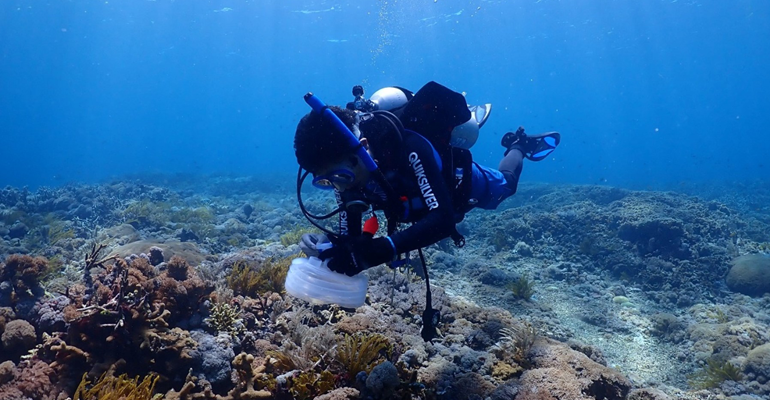PKSPL IPB University Collaborates with PT. AMNT to Develop Ecosystem-based Marine Tourism in the Gili Balu Conservation Area

The Center for Coastal and Marine Resources Studies (PKSPL) at IPB University conducted an integrated study to develop the implementation plan for the management of the Gili Balu Marine Tourism Conservation Park in West Sumbawa Regency, from August 27th to September 1st. This study was carried out in collaboration with the support of PT. AMMAN Mineral Nusa Tenggara (PT. AMNT).
The study covered both the marine and coastal areas of Poto Tano Village and its surrounding areas that are affected by activities in the Gili Balu Conservation Area. Gili Balu consists of eight small islands (Kenawa, Kalong, Ular, Mandiki, Kambing/Batu, Belang, Paserang/Pasaran, and Nyamuk/Namo). Among these islands, Kenawa Island has become the primary attraction for tourism in Gili Balu.
Based on the Minister of Maritime Affairs and Fisheries Decree No. 74 of 2021, the Gili Balu marine area was designated as a Conservation Area with the designation of a Marine Tourism Park covering an area of 5,845.67 hectares. In commitment and responsibility towards this, PT. AMNT entered into a joint agreement with the Provincial Government of West Nusa Tenggara, through the Department of Marine and Fisheries, to manage the Gili Balu Marine Park Conservation Area through Partnership Agreement No. 274 of 2022, aimed at enhancing the effectiveness of the management of the area.
To ensure the achievement of partnership goals, PT. AMNT collaborated with the Center for Coastal and Marine Resources Studies (PKSPL) at IPB University to develop an implementation plan and gather fundamental data on the potential of the waters and opportunities for integrated area governance. PKSPL IPB University initiated this study in March 2023 to identify existing issues and opportunities in the area and formulate a concept for its development and management.
“The concept to be applied in the Gili Balu area is called Ecosystem-based Marine Ecotourism Development in Gili Balu,” said Prof Yonvitner, Chairman of PKSPL IPB University.
He explained that the findings and concepts from this study were followed up with field research in August 2023. This field research aimed to identify the overall potential of existing aquatic resources, as well as other issues related to management practices, threats, and pressures in the surrounding areas. It also aimed to explore the potential integration between environmental improvement, community welfare enhancement, and genuine community engagement in the management and utilization of the area.
Prof Yonvitner further explained that the development program was designed comprehensively, including ecosystem rehabilitation, ecosystem condition improvement, and economic development with community empowerment directed toward achieving indicators of sustainable development goals. Active community groups involved in the project include Pokdarwis, Pokwasmas, Fishermen’s Groups, Poklahsar, and the Poto Tano Village Government, which serves as the gateway to the Gili Balu area.
“The Gili Balu Conservation Area is located in the Poto Tano District, West Sumbawa Regency. Its strategic position aligns with tourist traffic from Bali, Lombok, Sumbawa, and Labuan Bajo, making it an ideal location for tourism, especially marine tourism,” said Prof Yonvitner.
He added, “Up to this point, the managed potential resources in this area include capture fisheries, seaweed cultivation, and marine tourism. However, in recent times, destructive fishing practices using compressors, potassium cyanide, and explosives have been on the rise. The establishment of a conservation area is seen as a measure to reduce these threats, although they may not entirely disappear. Thus, effective management and supervision remain crucial agendas that can be implemented within a community-based collaboration framework.”
Prof Yonvitner explained that during the field study in August 2023, PKSPL IPB University conducted mapping and profiling of the ecosystem conditions, including mangroves, seagrasses, coral reefs, and fish. The center also collected data from relevant stakeholders, conducted tourist attraction analysis, developed seascape and landscape plans, designed governance structures, analyzed fisheries business potential, designed digital marketing strategies, and formulated program implementation plans.
“It is hoped that this implementation plan will ultimately realize effective conservation area management that balances ecosystem, social, and economic interests,” concluded Prof Yonvitner. (yop/nad/ra) (IAAS/RUM)



